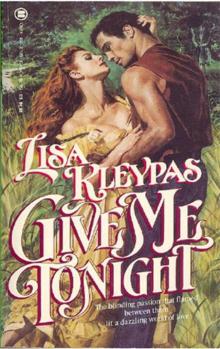- Home
- Lisa Kleypas
Devil in Winter Page 8
Devil in Winter Read online
Page 8
Ivo Jenner had possessed the first two qualities in moderation, but the third not at all. In the recent past he had lost a fortune at Newmarket, having become susceptible in his old age to the glib-tongued rogues who populated the racing world. Fortunately the club was such a powerful financial engine that it was able to absorb the heavy losses.
Sebastian’s unkind taunt that Jenner’s was a second-rate gambling palace was only partially correct. Evie knew from past conversations with her father, who had never bothered to mince words, that although his club was successful by anyone’s standards, it had never reached the heights to which he had aspired. He had wanted it to equal Craven’s, the rival club that had burned down so long ago. But Ivo Jenner had never been able to match the flair and devilish guile of Derek Craven. It was said that Craven had won the money of an entire generation of Englishmen. That Craven’s had disappeared at its zenith had solidified its legendary status in the collective memory of British society.
And while Jenner’s had not come close to the glory of Craven’s, it had not been for a lack of trying. Ivo Jenner had moved his own club from Covent Garden to King Street, which had once been a mere passageway into the fashionable shopping and residential area of St. James, but was now a regular roadway. After purchasing a large portion of the street and razing four buildings, Jenner had built a large and handsome club and advertised it as having the largest hazard bank in London. When gentlemen wished to play deep, they went to Jenner’s.
Evie remembered the club from her childhood, on the occasions when she had been allowed to visit her father for the day. It had been a well-appointed, if somewhat overelaborate place, and she had delighted in standing with him on the second-floor interior balcony and watching the action on the main floor. Grinning indulgently, Jenner would walk his daughter to St. James Street, where they would go to any shop she cared to visit. They went to the perfumer, the hatter’s, the book and print seller, and the bread and biscuit baker, who gave Evie a hot cross bun so fresh that the white piping of icing was half melting from the surface of the warm bread.
As the years passed, Evie’s visits to King Street had been curtailed. Although she had always blamed the Maybricks for it, she now realized that her father had also been partly responsible. It had been much easier for Jenner to love her as a child, when he could make her squeal by tossing her in the air and catching her in his burly arms. He could rumple her red hair, the same shade as his own, and soothe her tears upon leaving him by pressing a sweet or a shilling into her palm. But when she became a young woman, and he could no longer treat her like a little girl, their relationship had become awkward and distant. “This club’s no place for you, tibby,” he had told her with gruff fondness. “You has to stay away from a milling cove like me, and find some rum cull to marry.”
“Papa,” she had begged, stammering desperately, “d-don’t send me back there. Pl-please, please let me stay with you.”
“Little tangle-tongue, you belong with the Maybricks. And no use to hop the twig and run back here. I’ll only send you off again.”
Her tears had failed to sway him. During the ensuing years, Evie’s visits to her father’s club had dwindled to once every six months, or longer. Whether or not it was for her own good, the sense of being unwanted had sunk deep into her marrow. She had become so uneasy around men, so certain that they would be bored by her, that it had become a self-fulfilling prophecy. Her stammer worsened—the harder she fought to get the words out, the more incoherent she had become, until it was easiest to remain silent and fade into the woodwork. She had become an expert at being a wallflower. She had never been asked to dance, never been kissed, never been teased or courted. The only proposal she had ever received had been cousin Eustace’s reluctant offer.
Marveling at her change in fortune, Evie glanced at her husband, who had brooded silently during the past two hours. His eyes narrowed as he looked back at her. With his cold expression and cynical mouth, he seemed completely unlike the seductive scoundrel who had shared a bed with her two days earlier.
She turned her attention to the window as the scenery of London passed by her. Soon they would be at the club, and she would see her father. It had been six months since they had been together, and Evie had braced herself for a great change in him. Consumption was a common disease, and everyone was aware of its ravages.
It was a slow death of lung tissue, accompanied by fever, coughing, weight loss, and drenching sweats at night. When death arrived, it was usually welcomed by the victim, and all those who cared for him, as an end to the terrible suffering. Evie could not imagine her robust father being reduced to such a condition. She feared seeing him equally as much as she yearned to care for him. However, she kept this all to herself, suspecting that Sebastian would only mock her if she told him of her fears.
Her pulse quickened as the carriage rolled along St. James and turned onto King Street. The long brick and marble front of Jenner’s became visible, silhouetted against the yellows and reds of a ripening sunset that glowed through the ever-present haze that hung over London. Staring through the carriage window, Evie let out a tense sigh as the vehicle passed through one of the many alleys that led from the main thoroughfare to the mews and yards behind the row of buildings.
The carriage came to a halt at the back entrance, which was far preferable to entering through the front of the building. Jenner’s was not a place that nice women frequented. A gentleman might bring his mistress, or even a prostitute who had captured his passing interest, but he would never think of escorting a respectable lady into the club. Evie became aware that Sebastian was watching her with the dispassionate interest of an entomologist observing a new species of beetle. Her sudden paleness and her visible trembling could not have escaped his notice, but he offered no word or gesture of comfort.
Preceding her from the carriage, Sebastian fitted his hands around Evie’s waist and helped her down to the ground. The smell of the back alley was the same as it had been since Evie’s childhood—manure, garbage, liquor, and the crisp overlay of coal smoke. No doubt she was the only young woman of privileged upbringing in London to think that it smelled rather like home. At least it struck her nostrils more agreeably than the atmosphere at the Maybrick house, which was redolent of rotting carpets and bad cologne.
Wincing at the ache of muscles that had been cramped in the carriage for far too long, Evie went to the doorway. Entrances to the kitchen and other service rooms were located farther along the building, but this one opened to a staircase that went up to her father’s apartments. The driver had already summoned a club employee with a few decisive pounds of his fist at the door, and stepped back perfunctorily.
A young man appeared, and Evie was relieved to see a face that she recognized. It was Joss Bullard, a long-familiar figure at the club, who had worked there as a debt collector and an usher. He was large, stocky, and dark-haired, with a bullet-shaped head and a heavy jaw. Possessing a natural inclination toward surliness, Bullard had treated Evie with a bare minimum of courtesy whenever she had visited the club. However, she had heard her father praise him for his loyalty, and for that she was appreciative.
“Mr. Bullard,” she said, “I’ve c-come to see my father. Please allow me i-i-inside.”
The burly young man did not move. “’E ’asn’t asked for you,” he said gruffly. He switched his gaze to Sebastian, taking note of his expensive garments. “Go to the front, sir, if you’re a member.”
“Idiot,” Evie heard Sebastian mutter, and before he could continue, Evie interrupted hastily.
“Is Mr. Egan available at pr-present?” she asked, naming the club’s factotum, who had worked for her father for the past ten years. She had no great liking for Egan, who was a boastful, blustering sort, but he wouldn’t dare refuse her entrance to her own father’s club.
“Nay.”
“Then Mr. Rohan,” Evie said desperately. “Please tell him that M-Miss Jenner is here.”
“I told ye—”
“Get Rohan,” Sebastian snapped at the young man, and wedged his boot against the door to prevent it from being closed. “We’ll wait inside. My wife isn’t going to be kept standing out on the street.”
Looking startled by the cold gleam in the taller man’s eyes, the employee muttered his assent and disappeared swiftly.
Sebastian guided Evie over the threshold and glanced at the nearby staircase. “Shall we go upstairs?”
She shook her head. “I would rather speak to Mr. Rohan first, actually. I’m sure he’ll be able to tell me something about my father’s c-condition.”
At the sound of her slight stammer, Sebastian lifted his hand to the nape of her neck, slid it beneath her untidy hair, and squeezed gently. Though his face was still cold, his hand was warm and soothing, and she felt herself relax involuntarily. “Who is Rohan?”
“He’s one of the croupiers…he has been employed here since he was a boy. My father started him as a listmaker’s runner. You would remember Mr. Rohan, if you’ve seen him before. He is rather difficult to overlook.”
Sebastian pondered the remark and murmured, “He’s the Gypsy, isn’t he?”
“Half Gypsy, I believe, on his mother’s side.”
“What is the other half?”
“No one knows.” She threw him a guarded glance as she said quietly, “I’ve always wondered if he might be my half brother.”
Interest flickered in his pale eyes. “Did you ever ask your father?”
“Yes. He denied it.” However, Evie had never been quite convinced. Her father had always demonstrated a vaguely paternal manner with Cam. And she was not so naive as to believe that he hadn’t sired a few illegitimate children. He was a man of renowned physical appetites, and moreover he had never been one to worry over the consequences of his actions. Wondering if the same could be said of her husband, she asked cautiously, “Sebastian, have you ever…”
“Not that I’m aware of,” he said, understanding immediately. “I’ve always been inclined to use French letters—not only to prevent conception, but also to avoid the more exotic ailments that afflict the unwary.”
Bewildered by the statement, Evie murmured. “French letters? What are those? And what do you mean, ailments? Do you mean that doing…that…could make one ill? But how—”
“Good God,” Sebastian muttered, his fingers touching her mouth to still the questions. “I’ll explain later. It’s not the kind of thing one likes to discuss on the doorstep.”
Evie was prevented from asking further questions by the appearance of Cam Rohan. As Cam saw Evie, a faint smile came to his face, and he bowed gracefully. Even when Cam’s manner and movements were restrained, there seemed to be an invisible flourish, a suggestion of physical charisma. He was by far the best croupier at Jenner’s, though his appearance—that of a boy pirate—would hardly lead one to think so at first. He was about twenty-five, his body imbued with the slimness of young adulthood. The swarthy hue of his skin and the inky blackness of his hair betrayed his heritage, not to mention his first name, which was common for a Romany. Evie had always liked the soft-spoken young man, whose fierce loyalty to her father had been demonstrated numerous times over the years.
Cam was well-dressed in dark clothes and polished shoes, but as usual his hair wanted cutting, the thick black locks curling over the crisp white edge of his collar. And his long, lean fingers were adorned with a few gold rings. As his head lifted, Evie saw the glitter of a diamond stud in one ear—an exotic touch that suited him. Cam regarded her with the remarkable golden-hazel eyes that often lulled people into forgetting about the nimble mind behind them. At times his gaze was so penetrating that he seemed to be looking right through you…as if he were watching something behind you.
“Gadji,” Cam said softly, a friendly use of the Romany name for a non-Gypsy woman. He had an unusual accent, cultured, but tainted with hints of cockney and a sort of foreign rhythm, all blended in a unique mixture. “Welcome,” he said with a brief but dazzling smile. “Your father will be pleased to see you.”
“Thank you, Cam. I…I was afraid he might already h-have—”
“No,” Cam murmured, his smile dimming. “He is still alive.” He hesitated before adding, “Most of the time he sleeps. He won’t eat. I don’t think it will be long. He’s asked for you. I tried to send for you, but—”
“The Maybricks wouldn’t allow it,” Evie half whispered, her mouth tightening with anger. They had not bothered to tell her that her father had asked for her. And Joss Bullard had just lied to her. “Well, I’m away fr-from them for good, Cam. I’ve married. And I will remain here until my father…no longer n-n-needs me.”
Cam’s gaze swerved to Sebastian’s implacable countenance. Recognition kindled, and he murmured, “Lord St. Vincent.” If he had an opinion about Evie’s union with such a man, he did not reveal it.
Evie touched the surface of Cam’s coat sleeve. “Is my father awake now?” she asked anxiously. “May I go up to see him?”
“Of course.” The Gypsy took both her hands in a light grip, the gold rings warmed by the liberal heat of his fingers. “I will see to it that no one interferes.”
“Thank you.”
Suddenly Sebastian reached between them and plucked one of Evie’s hands away, pulling it decisively to his own arm. Though his manner was casual, the firm pressure of his fingers ensured that she would not try to pull away.
Puzzled by the display of possessiveness, Evie frowned. “I have known Cam since childhood,” she said pointedly. “He has always been quite kind to me.”
“A husband always likes to hear of kindnesses done for his wife,” Sebastian replied coolly. “Within limits, of course.”
“Of course,” Cam said softly. His attention returned to Evie. “Shall I show you upstairs, milady?”
She shook her head. “No, I know the way. Please r-return to what you were doing.”
Cam bowed again and exchanged a swift glance with Evie, both of them acknowledging tacitly that they would find an opportunity to talk later.
“Do you dislike him because he’s a Rom?” Evie asked her husband as they went to the stairs.
“I rarely dislike people for things they can’t change,” Sebastian replied sardonically. “They usually give me sufficient cause to dislike them for other reasons.”
Her hand fell away from his arm as she picked up her skirts.
“Where is the factotum, I wonder?” Sebastian continued, setting a palm at the small of her back as they ascended the stairs. “It’s early evening. The hazard room and the dining room are open—he should be busy.”
“He drinks,” Evie commented.
“That explains a great deal about the way this club is run.”
Sensitive to any insult about her father’s club, and uncomfortably aware of the gentle pressure of his hand on her back, Evie had to bite her tongue to hold back a stinging reply. How easy it was for a pampered nobleman to criticize the way professional men did things. If he had to run a place like this himself—perish the thought—he might have a great deal more respect for what her father had accomplished.
They climbed to the second level and proceeded along a second-floor gallery that wrapped completely around the upper part of the room. One had only to look over the balcony railings to view all the action of the main floor. This, the largest area of the club, was devoted entirely to hazard. Three oval tables covered with green baize cloth and yellow markings were surrounded by dozens of men. The sounds that floated upward—the constant rattle of dice, the quiet but intense exclamations of the casters and the croupiers, the soft drag of the little wooden rakes as they pulled money from the table into the croupier’s hands—they were among some of Evie’s earliest childhood recollections. She glanced at the magnificent carved desk in the corner of the room where her father had sat, approving credit, granting temporary memberships, and raising the hazard bank if the play had been too deep. At the moment the desk was occupied by a man of rather seedy a
ppearance whom she did not know. Her gaze moved to the opposite corner of the room, where another stranger acted as general supervisor, regulating payments and overseeing the pace of the play.
Pausing at the railing, Sebastian looked down at the main floor with an oddly intent expression. Wanting to go to her father at once, Evie gave an impatient tug at his arm. However, Sebastian did not budge. In fact, he barely seemed to notice her, so absorbed was he in the activities taking place downstairs. “What is it?” Evie asked. “Do you see something unusual? Something wrong?”
Sebastian shook his head slightly and dragged his attention from the main floor. His gaze moved around them, taking in the faded painted panels on the walls, the chipped molding, the threadbare piling of the carpeting. Jenner’s had once been splendidly decorated, but as the years had passed, it had lost much of its luster. “How many members of the club are there?” he asked. “Excluding temporary memberships.”
“There used to be something like two thousand,” Evie replied. “I don’t know what the current figures are.” She tugged at his arm again. “I want to see my father. If I must go unaccompanied—”
“You’re not to go anywhere unaccompanied,” Sebastian said, focusing on her with an bright immediacy that startled her. His eyes were like polished moonstones. “You could be pulled into one of the bawdy rooms by some top-heavy drunkard—or an employee, for that matter—and raped before anyone realizes you’re missing.”
“I’m perfectly safe here,” she countered with annoyance. “I am still acquainted with many of the employees, and I know my way around the club better than you do.”
“Not for long,” Sebastian murmured, and his gaze returned almost compulsively to the main floor. “I’m going to go over every inch of this place. I’m going to know all its secrets.”

 Devil in Spring
Devil in Spring Sugar Daddy
Sugar Daddy Devil in Winter
Devil in Winter Dreaming of You
Dreaming of You Christmas Eve at Friday Harbor
Christmas Eve at Friday Harbor Love, Come to Me
Love, Come to Me Only With Your Love
Only With Your Love Suddenly You
Suddenly You Secrets of a Summer Night
Secrets of a Summer Night Cold-Hearted Rake
Cold-Hearted Rake Where's My Hero?
Where's My Hero? Gifts of Love
Gifts of Love Married by Morning
Married by Morning Then Came You
Then Came You Wish List
Wish List Where Dreams Begin
Where Dreams Begin A Historical Christmas Present
A Historical Christmas Present Somewhere I'll Find You
Somewhere I'll Find You Scandal in Spring
Scandal in Spring Someone to Watch Over Me
Someone to Watch Over Me Worth Any Price
Worth Any Price Prince of Dreams
Prince of Dreams It Happened One Autumn
It Happened One Autumn Love in the Afternoon
Love in the Afternoon Devil's Daughter
Devil's Daughter A Wallflower Christmas
A Wallflower Christmas Tempt Me at Twilight
Tempt Me at Twilight Brown-Eyed Girl
Brown-Eyed Girl Mine Till Midnight
Mine Till Midnight Again the Magic
Again the Magic Lady Sophia's Lover
Lady Sophia's Lover Because You're Mine
Because You're Mine Midnight Angel
Midnight Angel Smooth-Talking Stranger
Smooth-Talking Stranger Blue-Eyed Devil
Blue-Eyed Devil Hello Stranger
Hello Stranger Dream Lake
Dream Lake Devil's Daughter: The Ravenels Meet the Wallflowers
Devil's Daughter: The Ravenels Meet the Wallflowers A Christmas to Remember
A Christmas to Remember Smooth Talking Stranger
Smooth Talking Stranger Crystal Cove
Crystal Cove Marrying Winterborne
Marrying Winterborne Stranger in My Arms
Stranger in My Arms Devil in Disguise
Devil in Disguise Worth Any Price bsr-3
Worth Any Price bsr-3 Give Me Tonight
Give Me Tonight Rainshadow Road fh-2
Rainshadow Road fh-2 Seduce Me At Sunrise
Seduce Me At Sunrise I Will
I Will Someone to Watch Over Me bsr-1
Someone to Watch Over Me bsr-1 Lady Sophias Lover bsr-2
Lady Sophias Lover bsr-2 A Hathaway Wedding
A Hathaway Wedding A Hathaway Wedding (Hathaways Bk2.5)
A Hathaway Wedding (Hathaways Bk2.5) Worth Any Price - Bow Street 3
Worth Any Price - Bow Street 3 Christmas with Holly
Christmas with Holly